-
- About the Department
- Vision
- Mission
- Program Educational Objectives (PEOs)
- Program Outcome (POs)
- Program Specific Outcomes (PSOs)
- Faculty Of Electrical Engineering
- Magazines
- Syllabus & Course Outline
- Laboratories
- Practices & Innovation in Teaching Learning
- Professional Society
- Departmental Activities(Guest Lectures & Industrial Visits)
- Academic Calendar
- Project
- Research & Development
Department of Civil Engineering
The Civil Engineering Department is one of the core branches of engineering that focuses on the design, construction, and maintenance of the built environment. This includes infrastructure such as roads, bridges, buildings, dams, canals, airports, railways, and water supply systems.
Civil Engineering is one of the broadest and oldest of the engineering disciplines, extending across many technical specialties. Civil Engineers plan, design, and supervise the construction of facilities essential to modern life like space satellites and launching facilities, offshore structures, bridges, buildings, tunnels, highways, transit systems, dams, airports, harbors, water supply system,s and wastewater treatment plants.
Vision
To excel in the area of Civil Engineering with a sound technical and multidisciplinary approach to produce proficient professionals with enrichment of Indian values and ethics.
Mission
- M1-To provide a congenial learning environment for excellence in delivering knowledge and assessment to ensure holistic development.
- M2-To prepare and motivate students for employment, entrepreneurship, higher education and research in structural analysis or other fields of Civil Engineering for the betterment of the society as well as the nation.
- M3- To impart Indian values and ethics with an ambience to nourish professional excellence which will produce globally accepted Civil Engineers.
Program Educational Objectives (PEOs)
- PEO1:-Graduate will apply technical expertise to identify and resolve complex Civil Engineering problems with the help of modern engineering tools.
- PEO2:-Graduate will be able to evolve cost effective solutions for a sustainable environment with deep insight into societal and ecological issues by adhering to professionalism.
- PEO3:-Graduate will be able to flourish leadership, ethical and communication skills which will facilitate working in a multidisciplinary environment.
Program Outcome (POs)
Engineering knowledge
Apply the knowledge of mathematics, science, engineering fundamentals, and an engineering specialization to the solution of complex engineering problems.
Problem analysis
Identify, formulate, review research literature, and analyse complex engineering problems reaching substantiated conclusions using first principles of mathematics, natural sciences, and engineering sciences.
Design/development of solutions
Design solutions for complex engineering problems and design system components or processes that meet the specified needs with appropriate consideration for the public health and safety, and the cultural, societal, and environmental considerations.
Conduct investigations of complex problems
Use research-based knowledge and research methods including design of experiments, analysis and interpretation of data, and synthesis of the information to provide valid conclusions.
Modern tool usage
Create, select, and apply appropriate techniques, resources, and modern engineering and IT tools including prediction and modelling to complex engineering activities with an understanding of the limitations.
The engineer and society
Apply reasoning informed by the contextual knowledge to assess societal, health, safety, legal and cultural issues and the consequent responsibilities relevant to the professional engineering practice.
Environment and sustainability
Understand the impact of the professional engineering solutions in societal and environmental contexts, and demonstrate the knowledge of, and need for sustainable development.
Ethics
Apply ethical principles and commit to professional ethics and responsibilities and norms of the engineering practice.
Individual and teamwork
Function effectively as an individual, and as a member or leader in diverse teams, and in multidisciplinary settings.
Communication
Communicate effectively on complex engineering activities with the engineering community and with society at large, such as, being able to comprehend and write effective reports and design documentation, make effective presentations, and give and receive clear instructions.
Project management and finance
Demonstrate knowledge and understanding of the engineering and management principles and apply these to one’s own work, as a member and leader in a team, to manage projects and in multidisciplinary environments.
Life-long learning
Recognize the need for, and have the preparation and ability to engage in independent and life-long learning in the broadest context of technological change.
Program Specific Outcomes (PSOs)
Faculty Of Civil Engineering
| Name of the Faculty | Designation | Department | Highest Qualification |
| DEVENDRA YADAV | ASST PROFESSOR (HOD) | CIVIL ENGINEERING | M TECH |
| ABHISHEK KUMAR | ASST PROFESSOR | CIVIL ENGINEERING | M TECH |
| SYED BUSTAN FATIMA WARSI | ASST PROFESSOR | CIVIL ENGINEERING | M TECH |
| PRASHANT MANI TRIPATHI | ASST PROFESSOR | CIVIL ENGINEERING | M TECH |
| SAJJAD SHABBIR | ASST PROFESSOR | CIVIL ENGINEERING | M TECH |
| RAJESH KUMAR BHARTI | ASST PROFESSOR | CIVIL ENGINEERING | M TECH |
| PRASHANT MISHRA | ASST PROFESSOR | CIVIL ENGINEERING | M TECH |
| SYED DANISH ALI | ASST PROFESSOR | CIVIL ENGINEERING | M TECH |
| SUMAN GUPTA | ASST PROFESSOR | CIVIL ENGINEERING | M TECH |
| ANKIT OJHA | ASST PROFESSOR | CIVIL ENGINEERING | M TECH |
| MAHENDRA PRATAP | ASST PROFESSOR | CIVIL ENGINEERING | M TECH |
| SATISH KUMAR | ASST PROFESSOR | CIVIL ENGINEERING | M TECH |
| AYUSH TRIPATHI | ASST PROFESSOR | CIVIL ENGINEERING | M TECH |
| OMENDRA KUMAR | ASST PROFESSOR | CIVIL ENGINEERING | M TECH |
| AMOL GUPTA | ASST PROFESSOR | CIVIL ENGINEERING | M TECH |
Syllabus & Course Outline
Laboratories
- Concrete & Material Testing Lab
- Soil Mechanics Lab
- Environmental Lab
- Transportation Lab
- Surveying Lab
- Hydraulics Lab
- CAD & GIS Lab
- Fluid Mechanics Lab
- Structural Analysis Lab
- Building Materials Lab
- Environmental Engineering Lab
- Hydraulics & Hydraulic Machines Lab
- Surveying Lab
- Geo-Informatics Lab
- Geo-Technical Engineering Lab
- Transportation Lab
Practices & Innovation in Teaching Learning
RRIMT adopts a comprehensive and student-centered approach to teaching and learning, ensuring that our students are equipped with both the theoretical foundation and practical skills necessary to succeed in the competitive field of software development. Our teaching-learning methodologies are designed to promote critical thinking, problem-solving, hands-on experience, and industry relevance.
- Student-Centered Learning Approach
We follow a student-centered approach that encourages active participation, deep learning, and collaborative efforts. This methodology aligns with the current trends in education and enhances the overall learning experience by promoting greater engagement with the subject matter.
-
-
- Interactive Lectures
-
-
-
- Project-Based Learning
-
- Blended Learning
A combination of traditional classroom learning and online resources is employed to cater to different learning styles and preferences. Blended learning ensures that students not only grasp foundational concepts but also have access to additional learning material such as online tutorials, videos, and software development tools.
-
-
- e-Learning Platforms
-
-
-
- Flipped Classroom Model
-
- Hands-On Learning
In the software branches, practical learning is at the core of our methodology. We provide students with the necessary tools, platforms, and environments to apply the concepts they learn in real-time.
-
-
- Laboratory Work
-
-
-
- Industry Tools & Software
-
- Collaborative Learning and Peer Interaction
We emphasize collaborative learning, where students work in teams, mimicking industry settings. This approach develops their interpersonal and communication skills, both of which are crucial in the software development field.
-
-
- Group Projects and Hackathons
-
-
-
- Peer Review & Code Sharing
-
- Industry-Institute Interface
A key element of our teaching-learning methodology is maintaining close ties with the industry. This ensures that students are exposed to the latest trends, tools, and technologies used in the software industry.
-
-
- Industrial Visits
-
-
-
- Guest Lectures and Workshops
-
-
-
- Internships
-
- Continuous Assessment and Feedback
Assessment is an ongoing process designed to evaluate both theoretical understanding and practical skills development.
-
-
- Formative Assessments: Regular quizzes, assignments, presentations, and coding challenges assess students’ understanding and progress throughout the course.
- Summative Assessments: At the end of each semester, students undergo final exams and major projects to demonstrate their competency in software engineering concepts.
- Feedback Mechanisms: Continuous feedback from faculty, industry mentors, and peer reviews is incorporated to guide students and improve their performance.
-
- Industry-Relevant Curriculum
The curriculum is designed to match the current needs and trends of the software industry, ensuring that students are well-prepared to tackle real-world software engineering challenges.
-
-
- Modular Approach
-
-
-
- Capstone Projects
-
- Outcome-Based Education (OBE)
Our teaching-learning methodology is in line with the Outcome-Based Education (OBE) framework, which focuses on the outcomes and results of the learning process. The curriculum and teaching methods are aligned with specific program outcomes (POs) and program educational objectives (PEOs), ensuring that graduates meet the professional, ethical, and technical expectations of the software industry.
At R.R. Group of Institutions, we are committed to delivering a high-quality education in Software Engineering through an innovative and effective teaching-learning methodology. Our approach integrates theoretical knowledge with practical experience, ensuring that our students are not only prepared to meet the challenges of the industry but also equipped to lead and innovate in the evolving field of software development.
Key Areas of Study In Civil Engineering
- Structural Engineering – Design and analysis of buildings, bridges, and other structures.
- Geotechnical Engineering – Study of soil and foundations for supporting structures.
- Transportation Engineering – Planning, design, and management of transport systems.
- Environmental Engineering – Waste management, pollution control, and sustainable development.
- Water Resources Engineering – Hydraulics, irrigation, flood control, and water management.
- Construction Management – Project planning, cost estimation, and construction methods.
Surveying & Geomatics – Land surveying, GPS, and remote sensing technologies.
Career Opportunities
Graduates can work in: Construction companies, Government and municipal agencies, Infrastructure and transport firms, Environmental consultancies, Research & academia
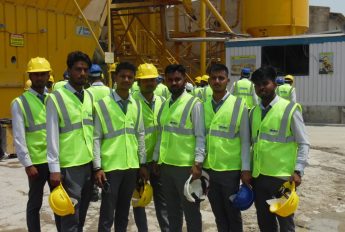
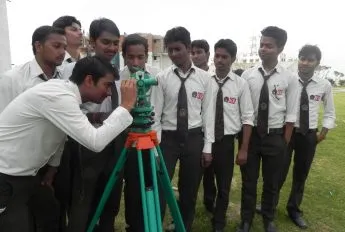
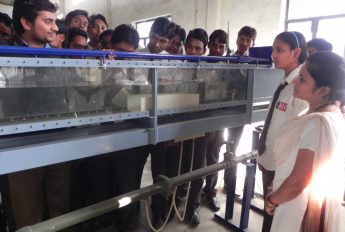
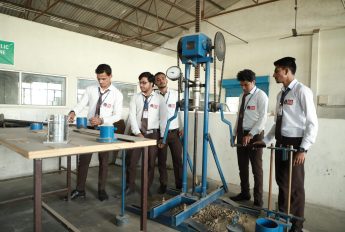
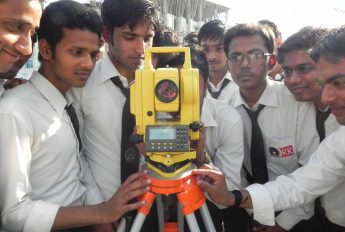
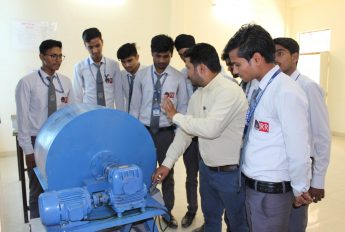
- Address
NH-24, Bakshi Ka Talab, Sitapur Road, Lucknow-226201 (UP) India - Phone
8756008853, 9161888853, 18001020833 (Toll Free) - Email
admissions@rrgi.in - rrimtedu@gmail.com
Department of Civil Engineering
Vision
To excel in area of civil engineering with sound technical and multidisciplinary approach to produce proficient professionals with enrichment of Indian values and ethics.
Mission
- To provide congenial learning environment for excellence in delivering knowledge and assessment to ensure holistic development.
- To prepare and motivate students for employment, entrepreneurship, higher education and research for the betterment of the society as well as the nation.
- To impart Indian values and ethics with an ambience to nourish professional excellence which will produce globally accepted Civil Engineers.
Program Educational Objectives (PEOs)
- Graduate will apply technical expertise to identify and resolve complex Civil Engineering problems with the help of modern engineering tools.
- Graduate will be able to evolve cost effective solutions for sustainable environment with deep insight into societal and ecological issues by adhering to professionalism.
- Graduate will able to flourish professional ethics and leadership with communication skill facilitating to work in a multidisciplinary environment.
Program Outcome (POs)
Identify, formulate, review research literature, and analyse complex engineering problems reaching substantiated conclusions using first principles of mathematics, natural sciences, and engineering sciences.
Design solutions for complex engineering problems and design system components or processes that meet the specified needs with appropriate consideration for the public health and safety, and the cultural, societal, and environmental considerations.
Use research-based knowledge and research methods including design of experiments, analysis and interpretation of data, and synthesis of the information to provide valid conclusions.
Create, select, and apply appropriate techniques, resources, and modern engineering and IT tools including prediction and modelling to complex engineering activities with an understanding of the limitations.
Apply reasoning informed by the contextual knowledge to assess societal, health, safety, legal and cultural issues and the consequent responsibilities relevant to the professional engineering practice.
Understand the impact of the professional engineering solutions in societal and environmental contexts, and demonstrate the knowledge of, and need for sustainable development.
Apply ethical principles and commit to professional ethics and responsibilities and norms of the engineering practice.
Function effectively as an individual, and as a member or leader in diverse teams, and in multidisciplinary settings.
Communicate effectively on complex engineering activities with the engineering community and with society at large, such as, being able to comprehend and write effective reports and design documentation, make effective presentations, and give and receive clear instructions.
Demonstrate knowledge and understanding of the engineering and management principles and apply these to one’s own work, as a member and leader in a team, to manage projects and in multidisciplinary environments.
Recognize the need for, and have the preparation and ability to engage in independent and life-long learning in the broadest context of technological change.
FACULTY OF Civil Engineering

RAVI KUMAR
ASST PROFESSOR (M.Tech.)

HIMANSHU SINGH
ASST PROFESSOR (M.Tech.)

SUMAN GUPTA
ASST PROFESSOR (M.Tech.)

AISHWARYA SHRIVASTAVA
ASST PROFESSOR (M.Tech.)

SAUMYA YADAV
ASST PROFESSOR (M.Tech.)

ANKIT OJHA
ASST PROFESSOR (M.Tech.)

MANJEET SINGH
ASST PROFESSOR (M.Tech.)

AJAY KUMAR
ASST PROFESSOR (M.Tech.)

SAJJAD SHABBIR
ASST PROFESSOR (M.Tech.)

SHUBHAM RAJ
ASST PROFESSOR (M.Tech.)

CHANDRA KUMAR
ASST PROFESSOR (M.Tech.)

SUSHANT KUMAR
ASST PROFESSOR (M.Tech.)

BALRAM YADAV
ASST PROFESSOR (M.Tech.)

SATISH KUMAR
ASST PROFESSOR (M.Tech.)

SYED BUSTAN FATIMA WARSI
ASST PROFESSOR (M.Tech.)

PRASHANT MANI TRIPATHI
ASST PROFESSOR (M.Tech.)

KESHAV MISHRA
ASST PROFESSOR (M.Tech.)

SHIVANSHU SINGH
ASST PROFESSOR (M.Tech.)

RAMENDRA KUMAR SINGH
ASST PROFESSOR (M.Tech.)
Duties of a Civil Engineer
- Civil engineers are involved in the design and building of highways, bridges and tunnels, schools, hospitals, airports and other buildings, sewage systems and water treatment facilities.
- Most structures, large and small, require the help of a civil engineer whether in the designing, planning or managing of the project.
- Civil engineers also help to preserve our environment by assisting in the cleaning up of existing pollution and planning ways to reduce future pollution of our air, land and water
Touted among the top civil engineering college in Lucknow, the department of Civil Engineering at RRIMT has a well-qualified faculty and enriched laboratories keeping in mind the contemporary developments. The students are given opportunities to become conversant with software like STAA, D-Pro, PULSE, ME Scope Model Software, FLAC, UNIPAC etc. for analysis of practical civil engineering problems. The department also organizes various short-term training programs for its students besides several seminars/conferences and awareness programs on the themes of emerging fields.
The laboratories established by the department are as follows :
- Fluid Mechanics Lab
- Structural Analysis Lab
- Building Materials Lab
- Environmental Engineering Lab
- Hydraulics & Hydraulic Machines Lab
- Surveying Lab
- Geo-Informatics Lab
- Geo-Technical Engineering Lab
- Geo-Technical Engineering Lab
- Transportation Lab